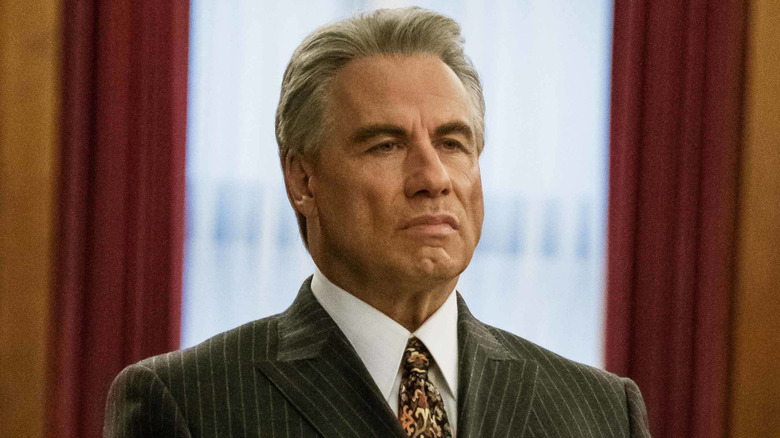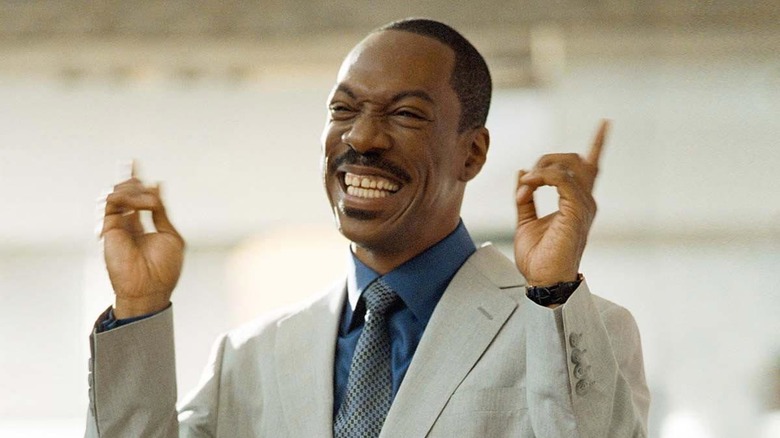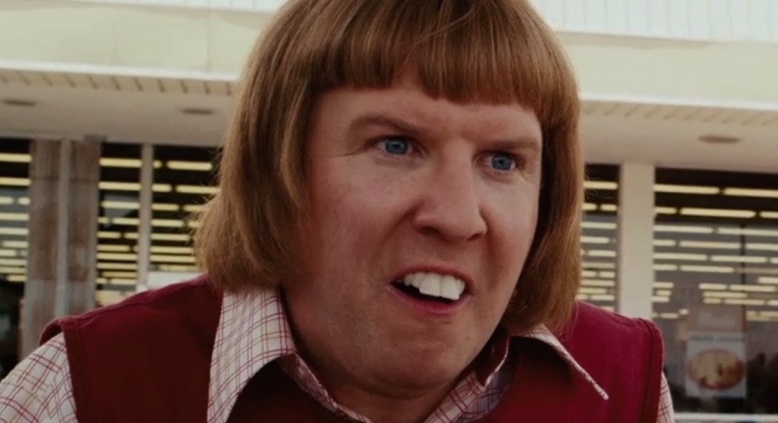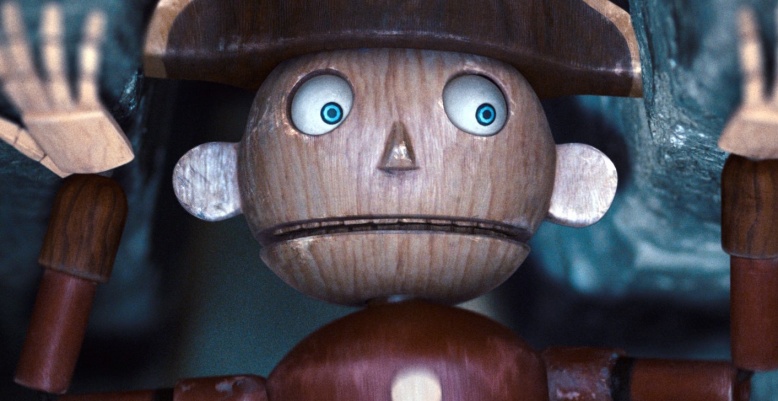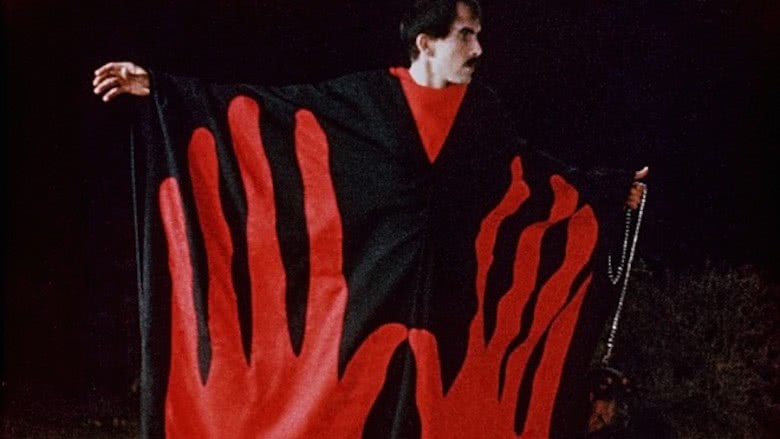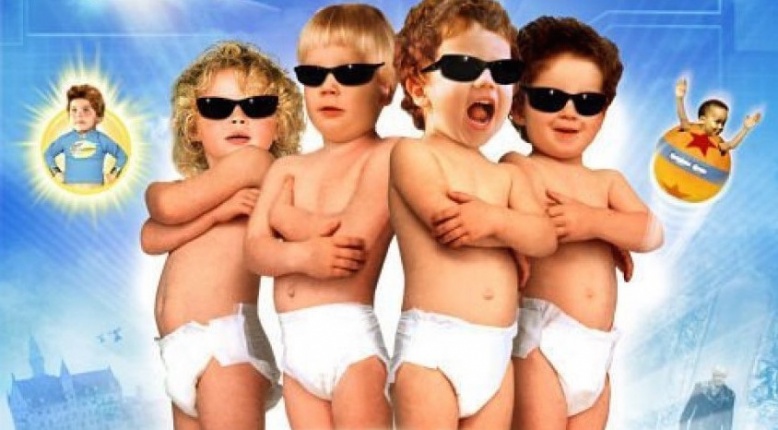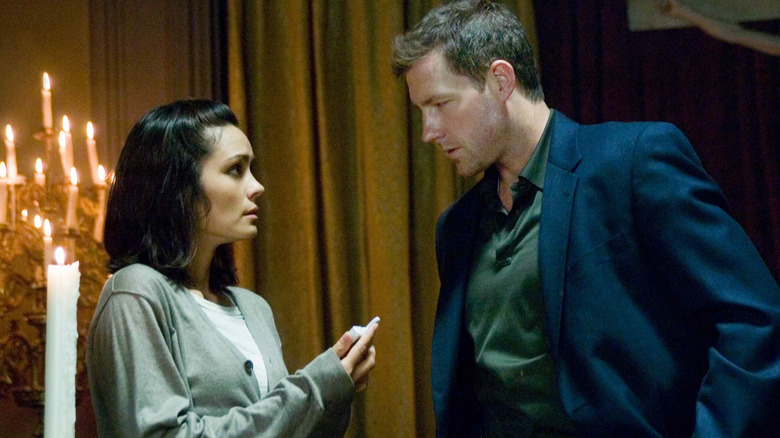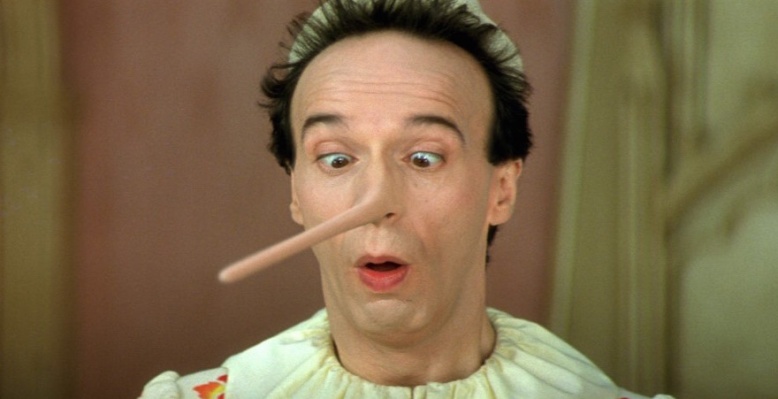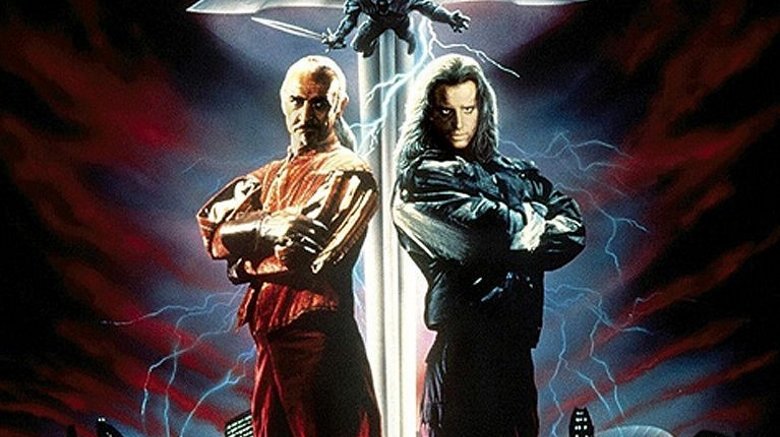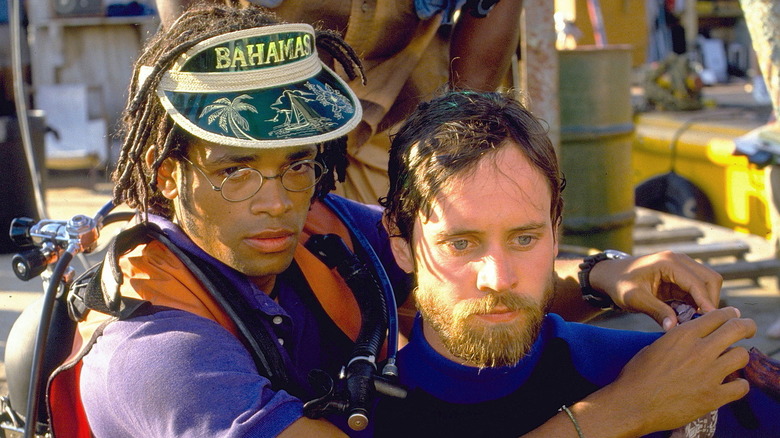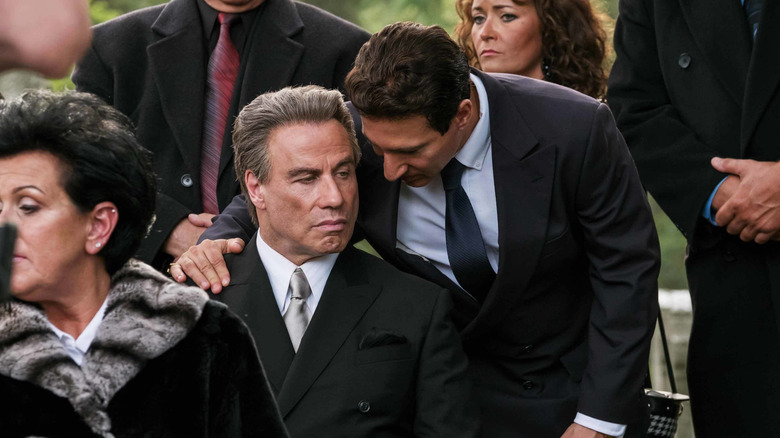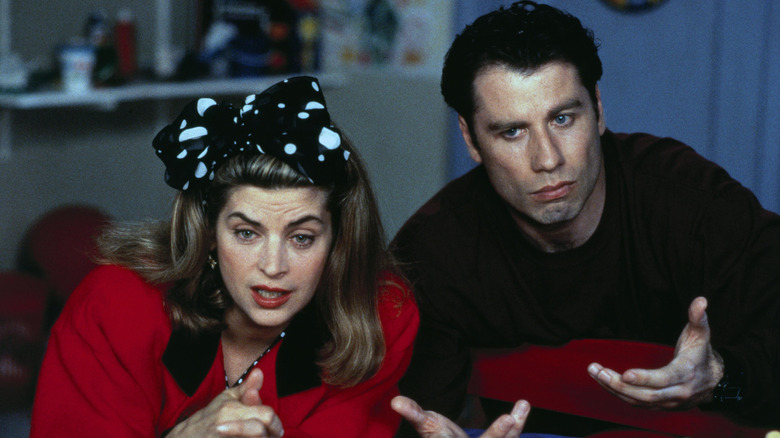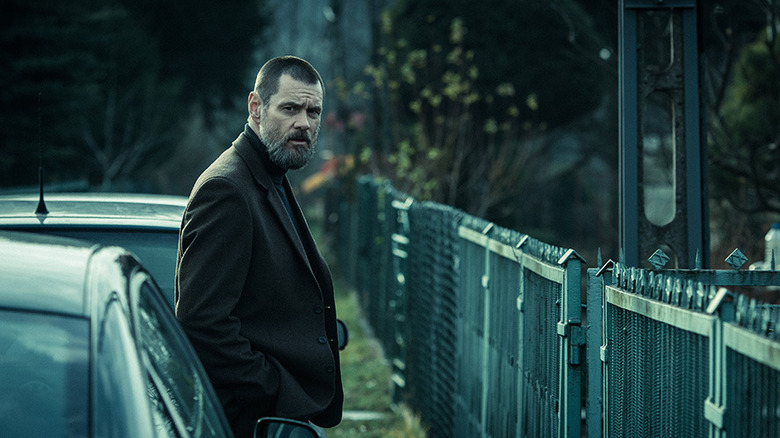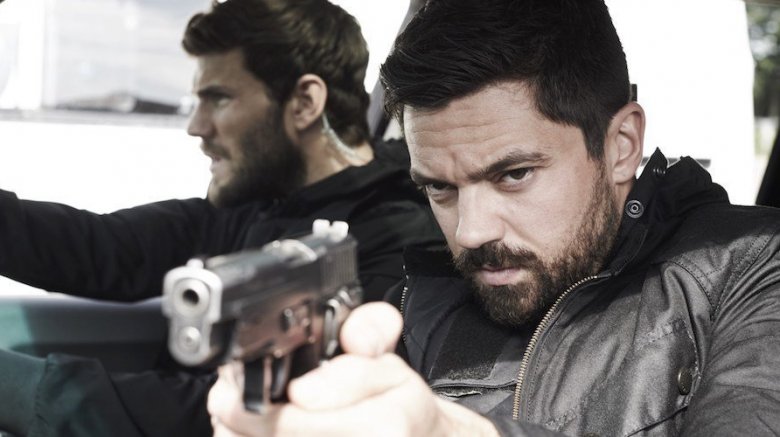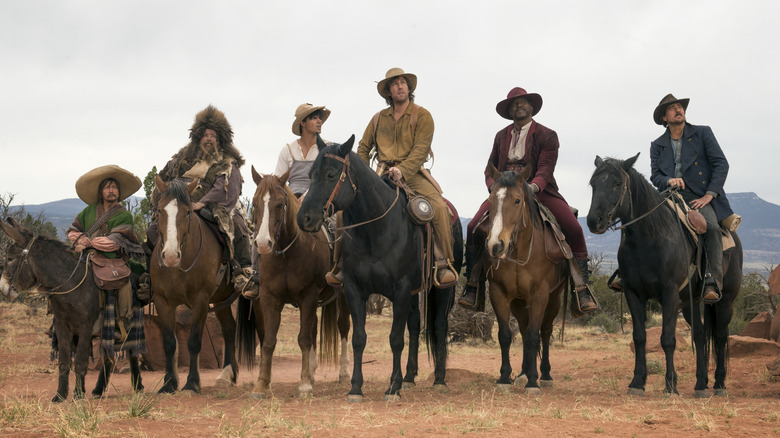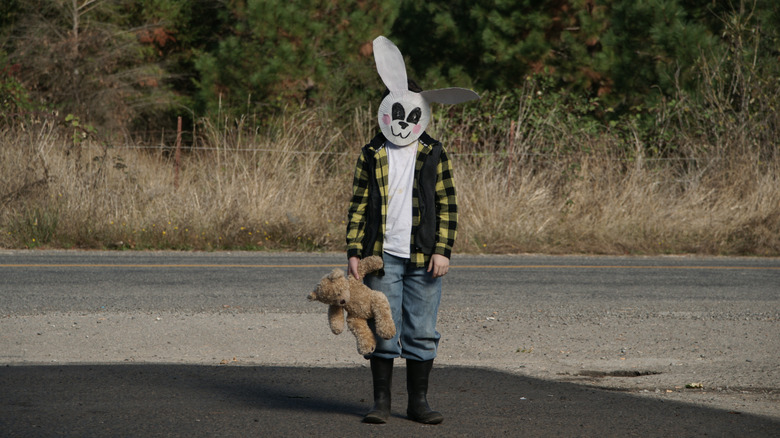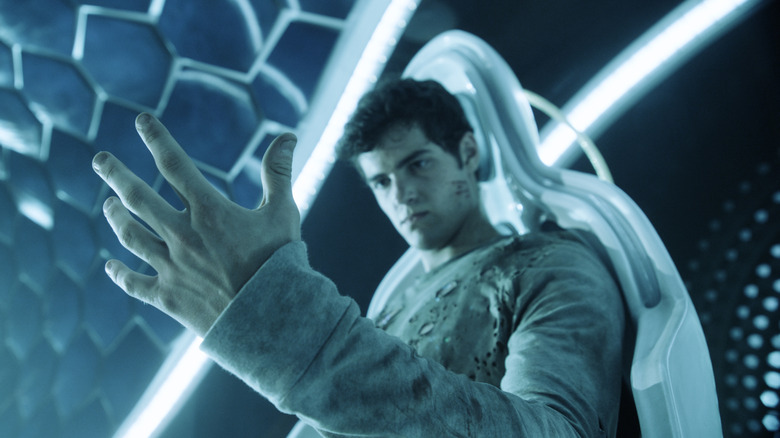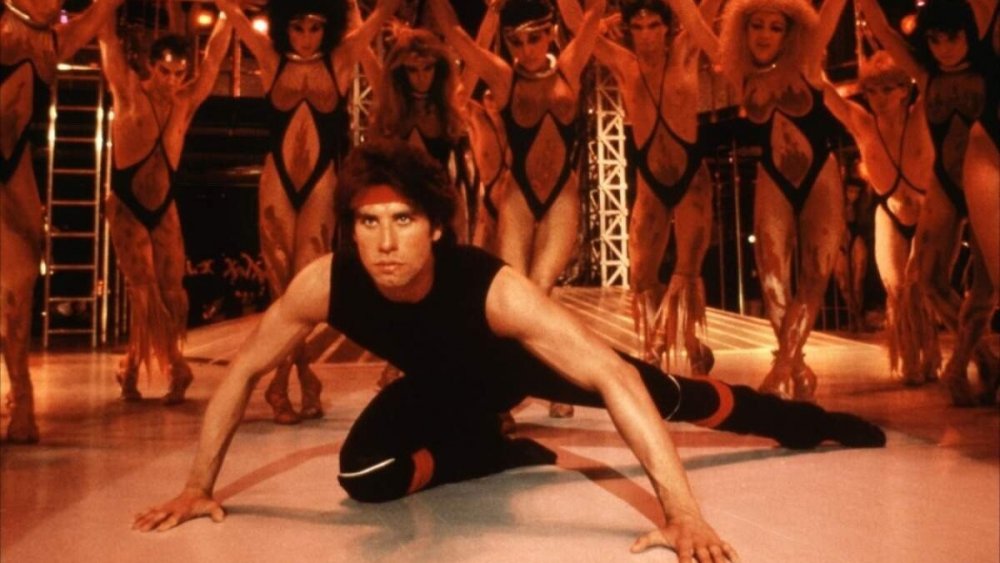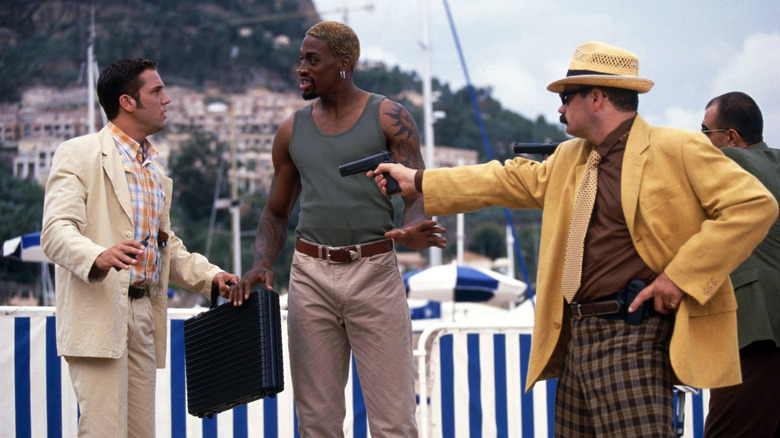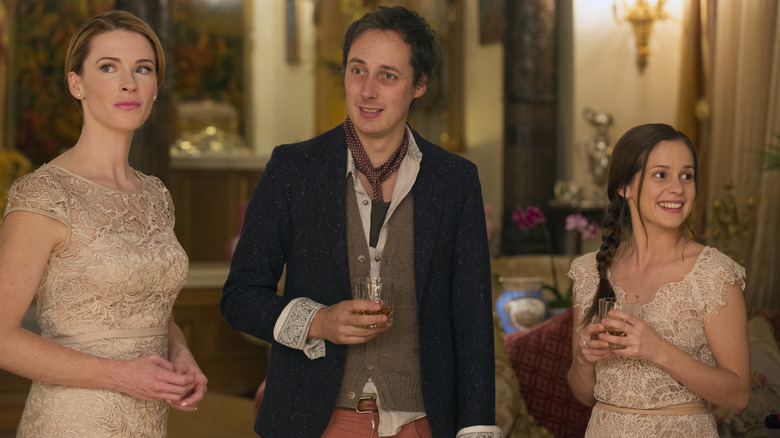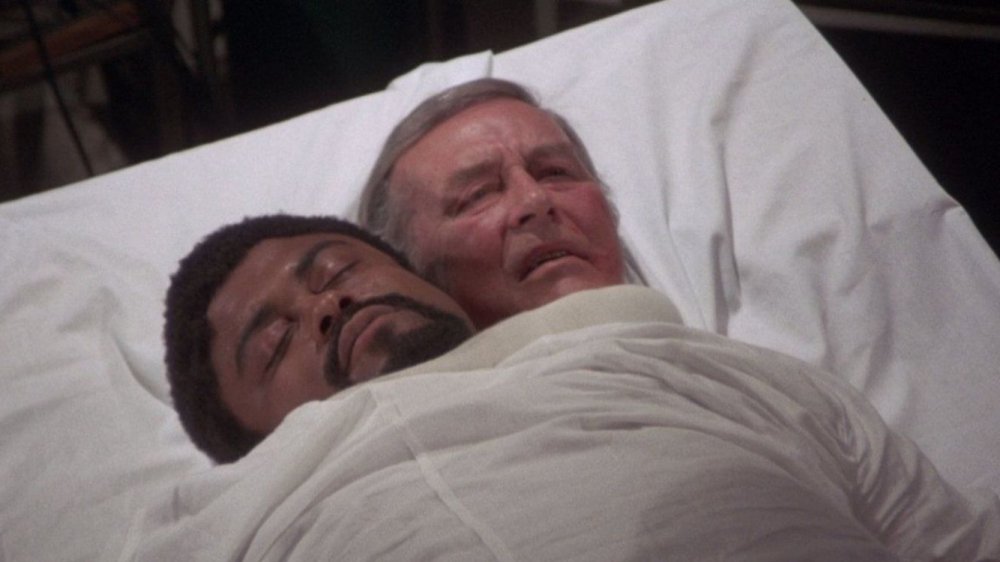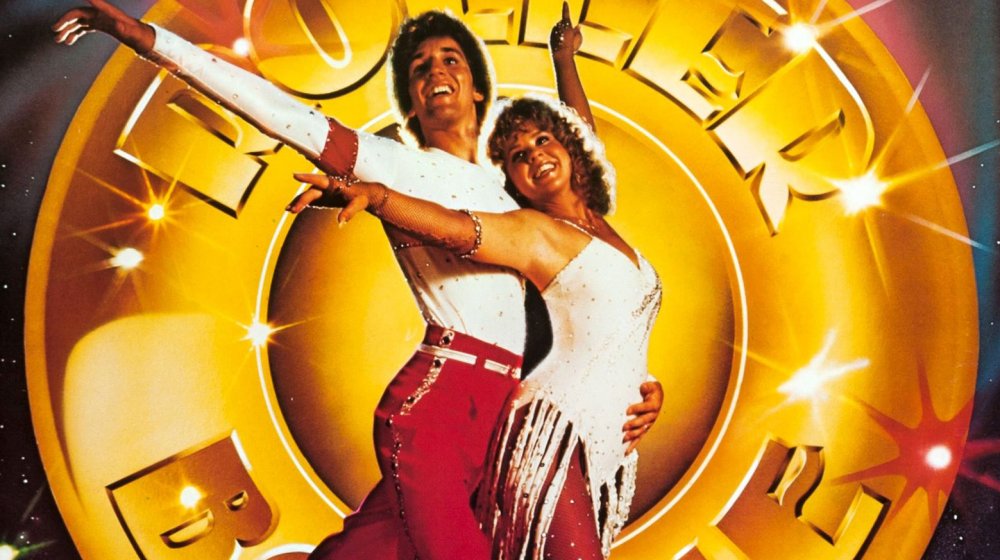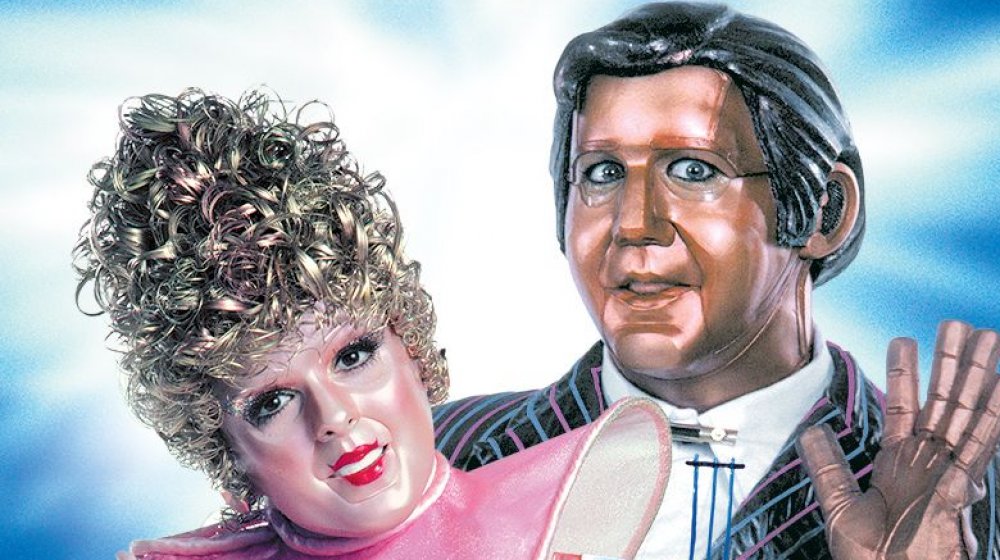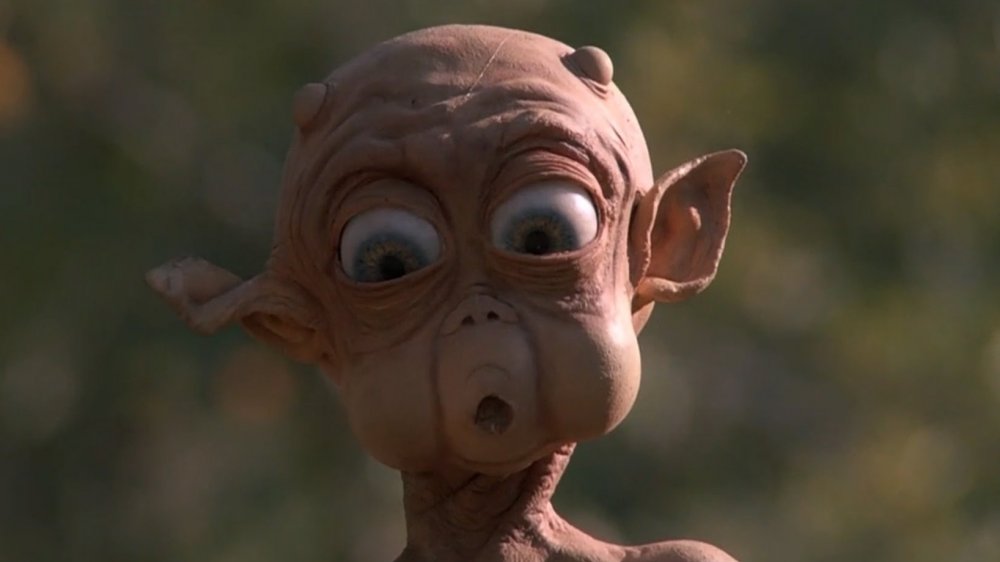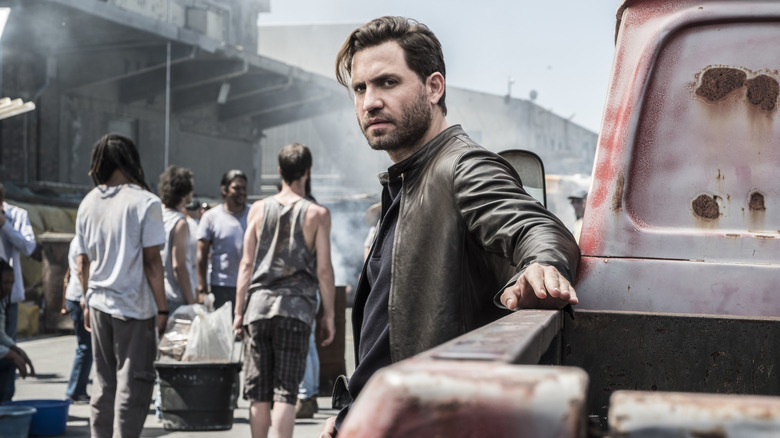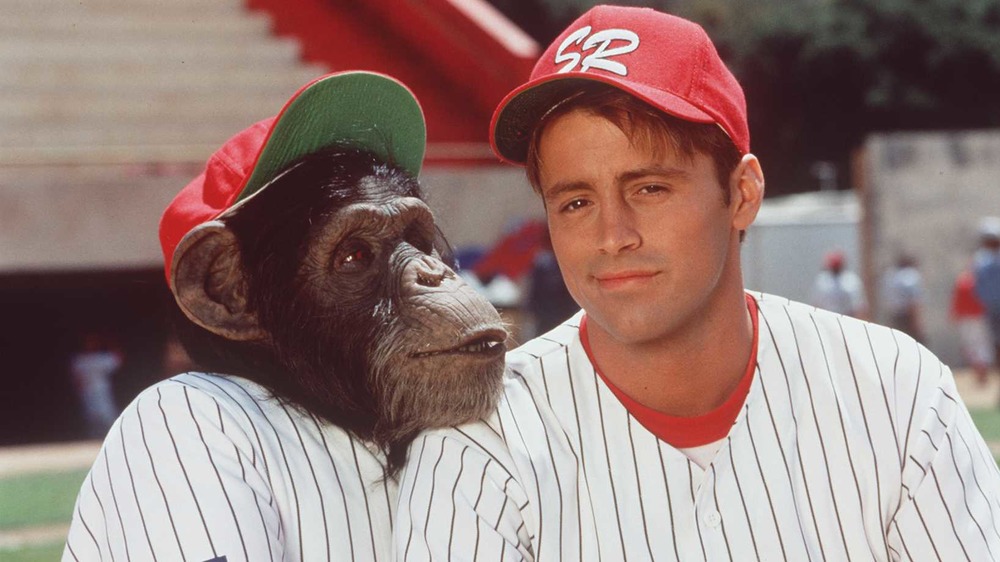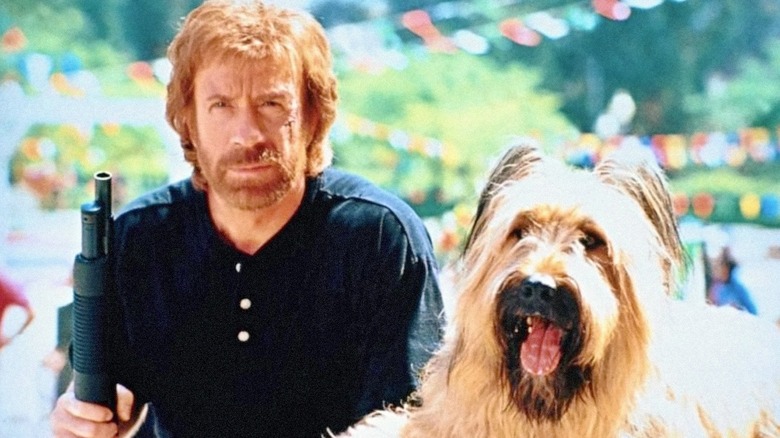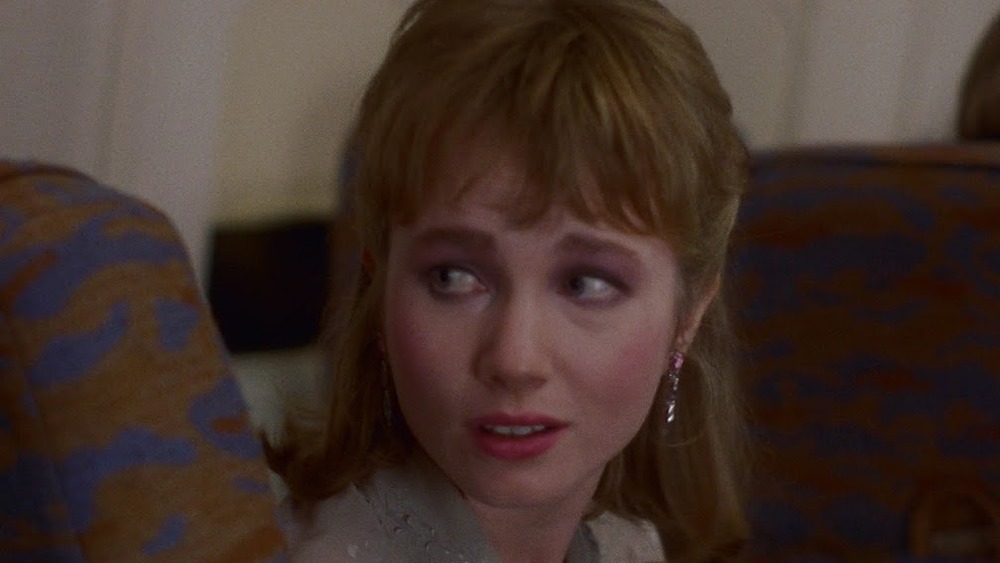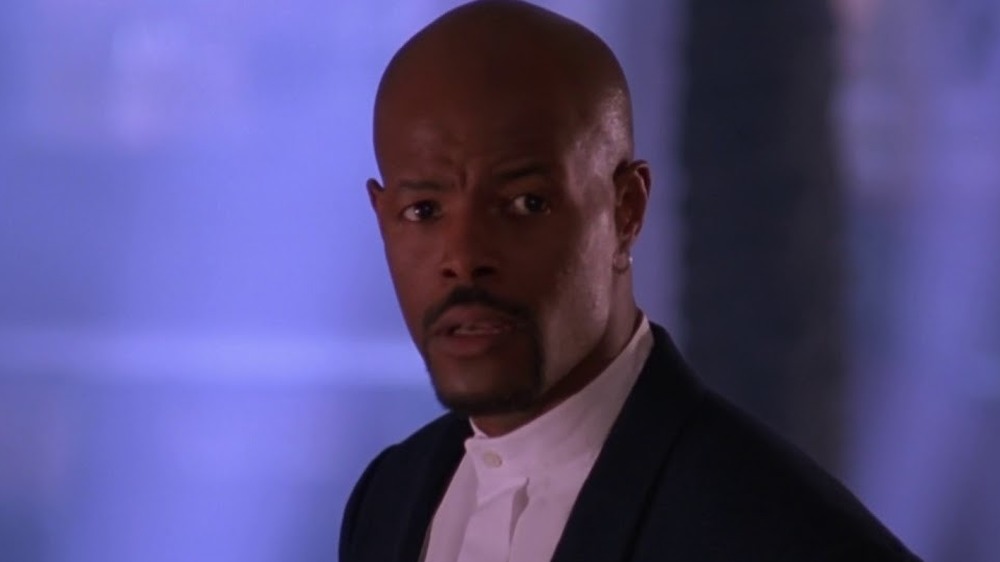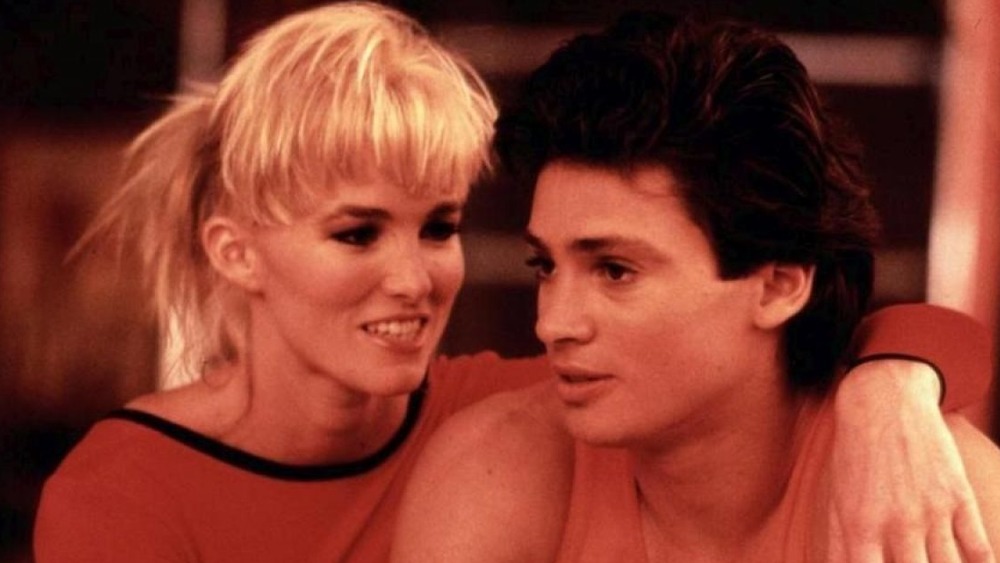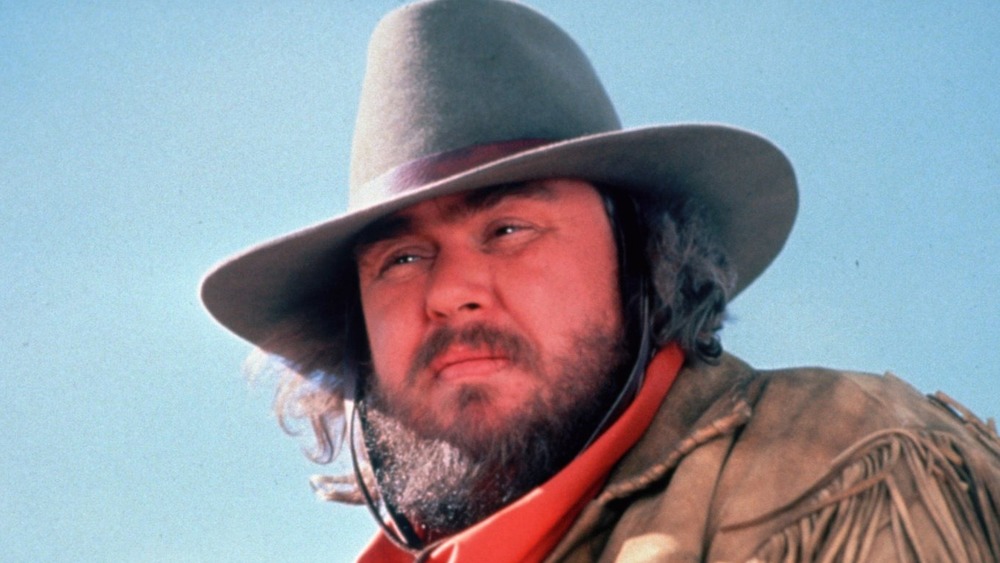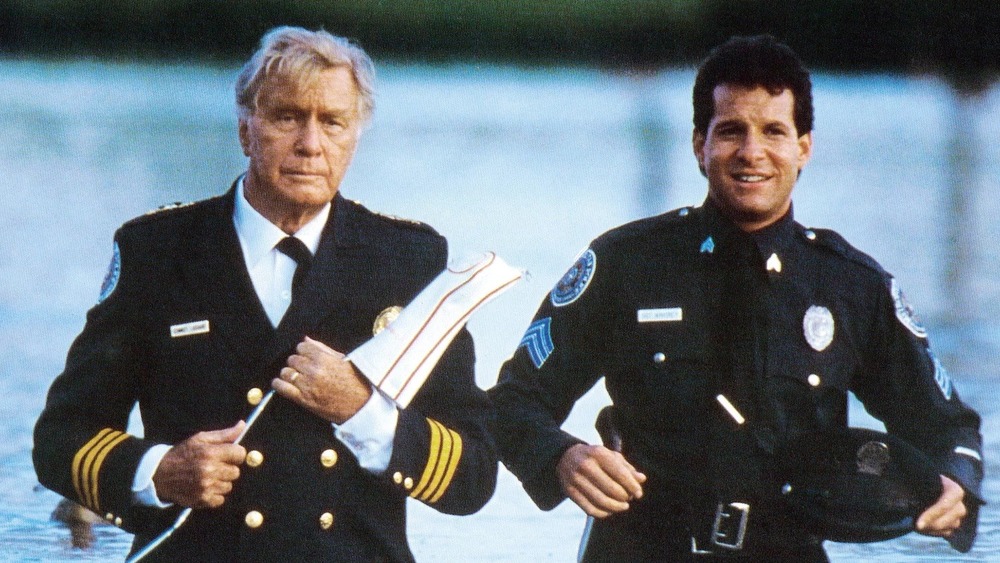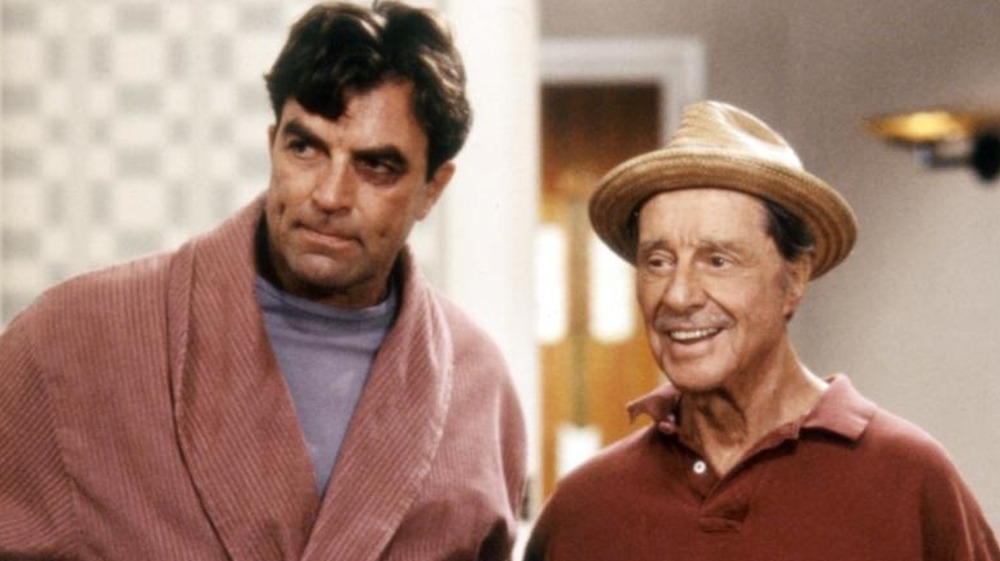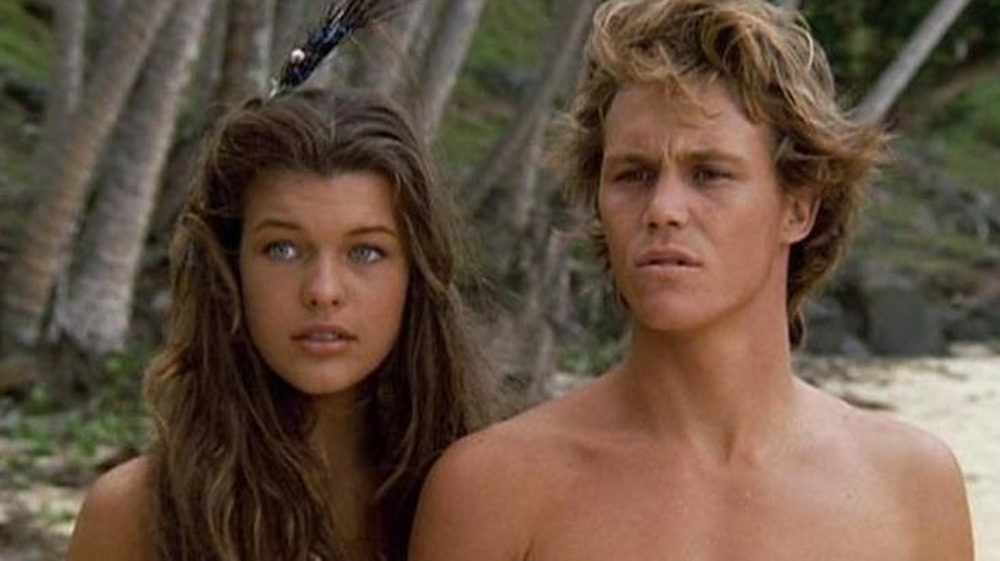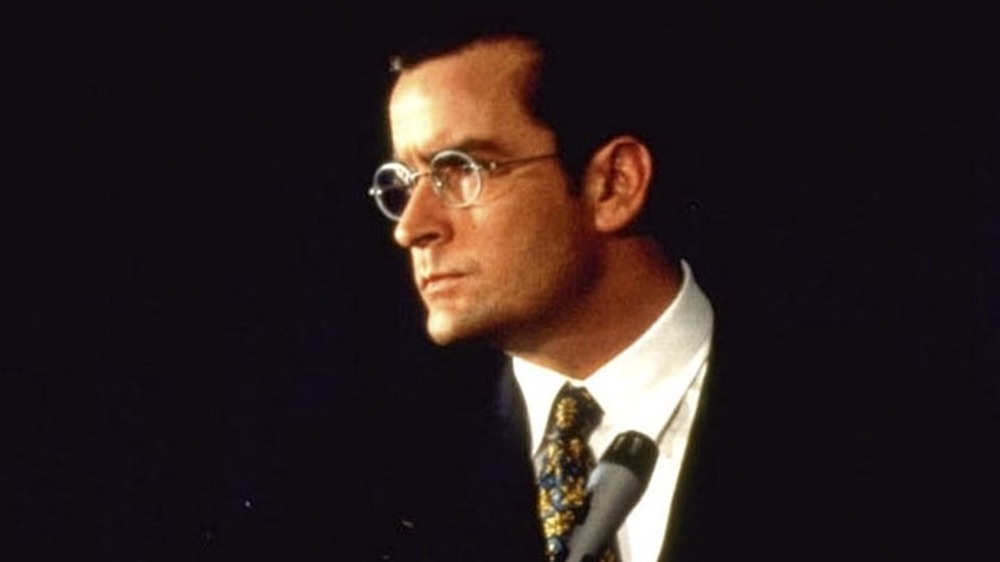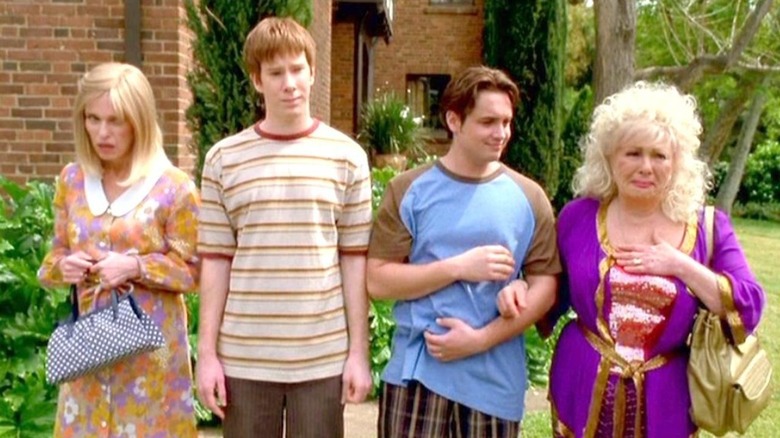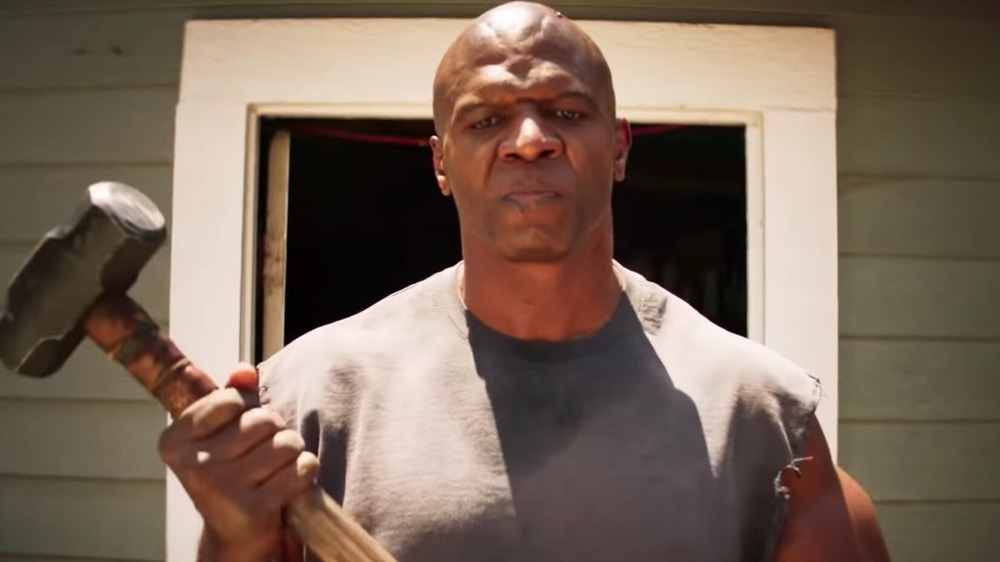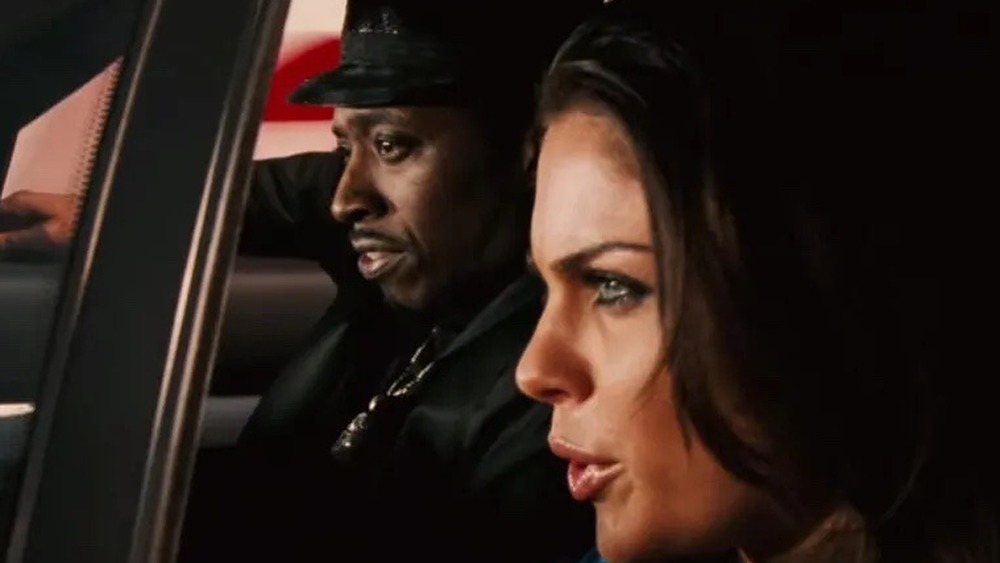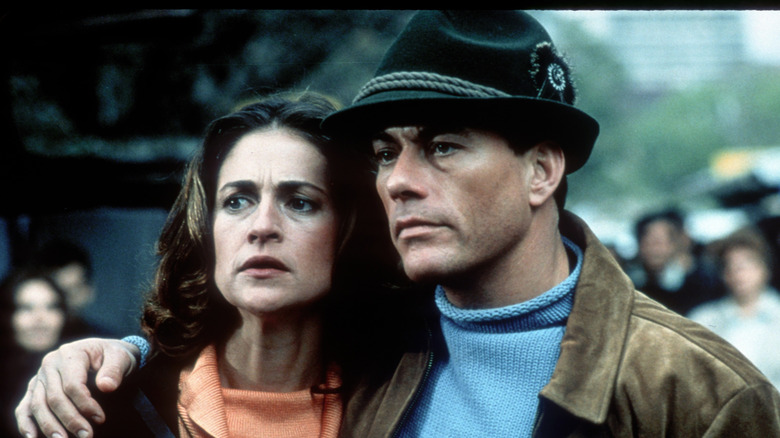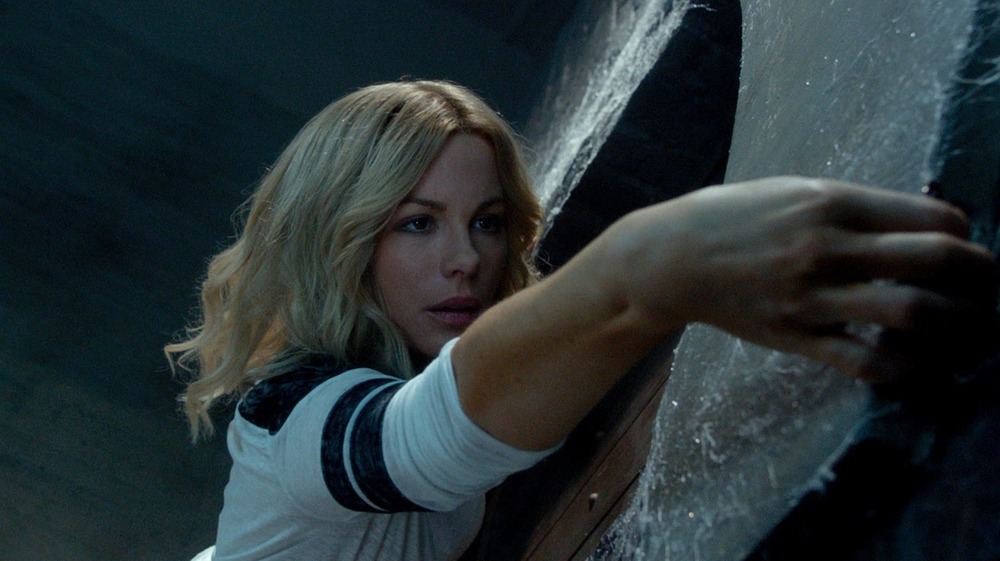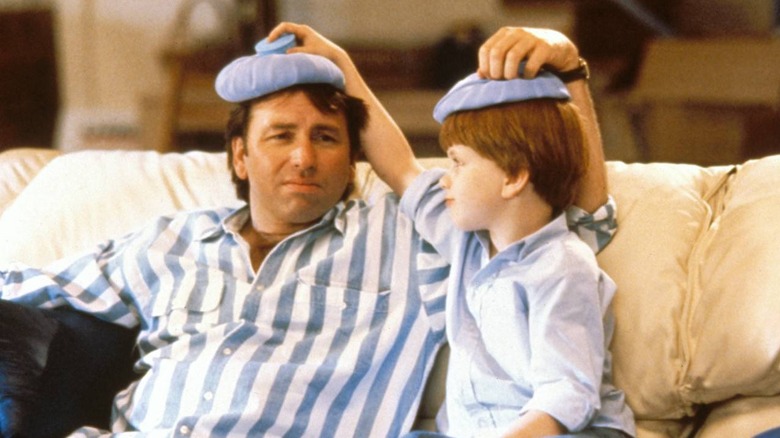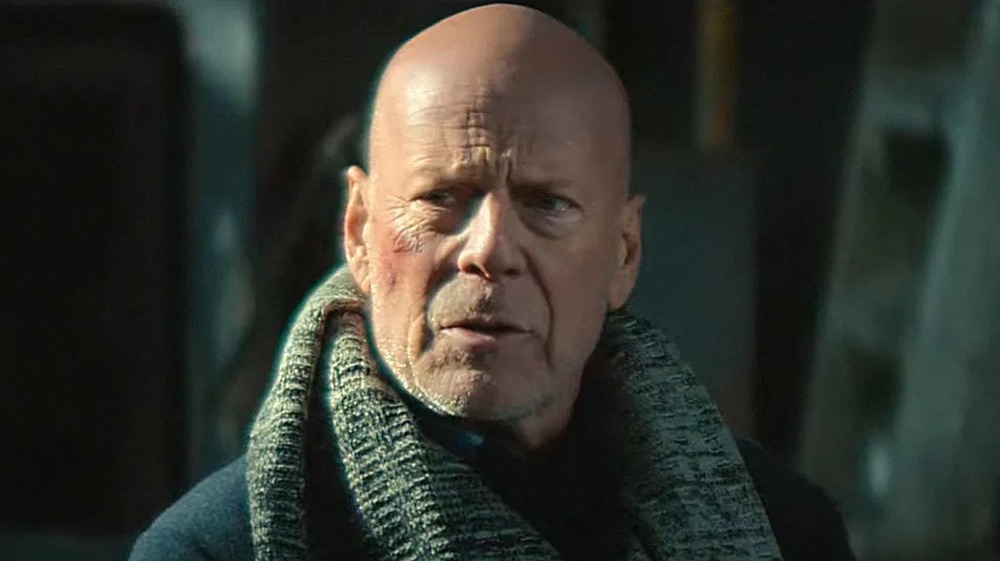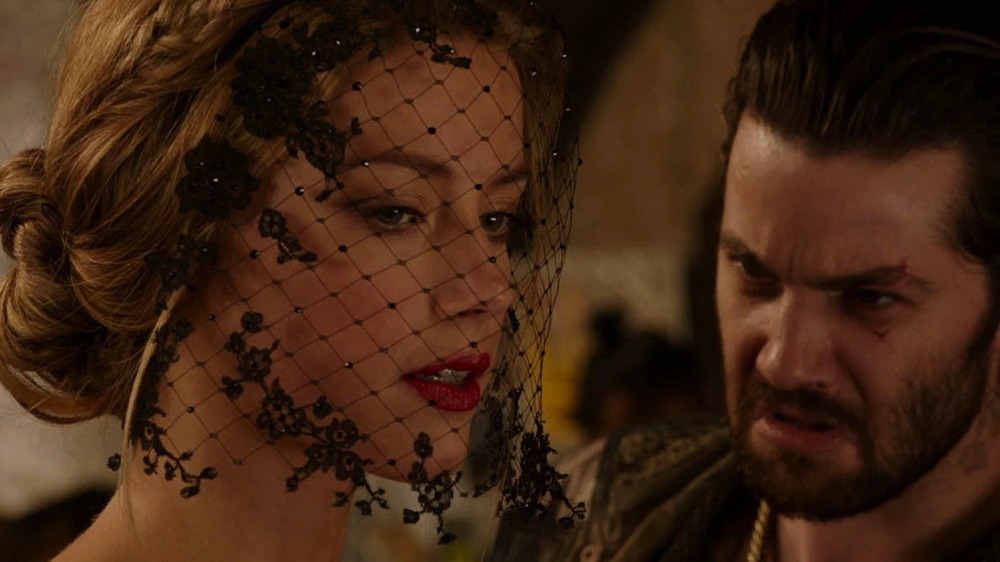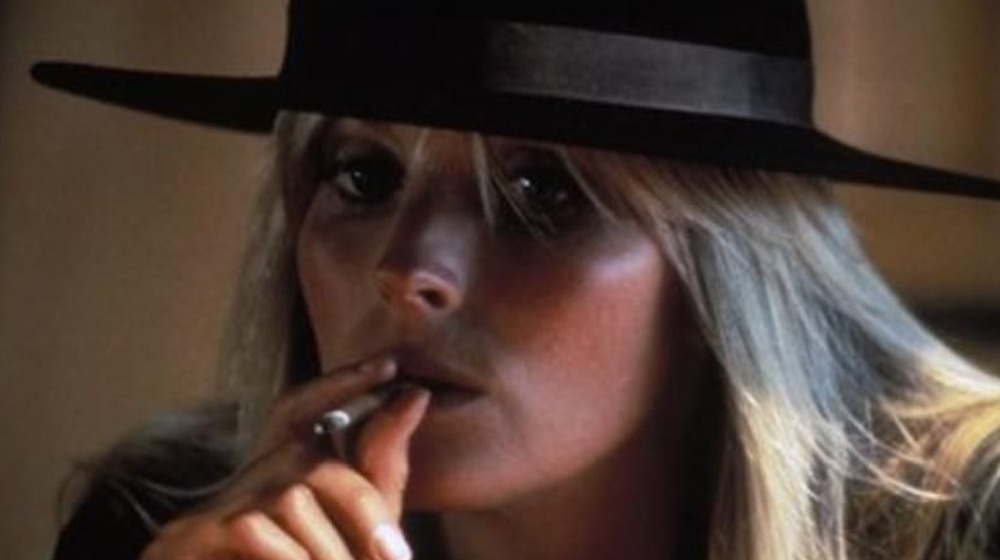Movies That Earned A 0% Rating On Rotten Tomatoes
Movies with a low rating on Rotten Tomatoes are common, but if you've been paying attention to the world around you, you know it's almost impossible to get a big group of people to agree on anything—and movie critics are some of the crankiest people of all, so any film that manages to achieve a zero percent represents a rare kind of perfection. Sure, it isn't the type of perfect the filmmakers were going for, but to get any kind of unanimous response on a film is quite a feat. Though purposely watching a bad movie can seem like a complete waste of time, when a movie is this bad, it really has to be seen to be believed—and these epic flops offer universally reviled proof. Here's a (semi-) fond look back at the unlucky and unloved movies that have managed to earn a 0 percent rating on Rotten Tomatoes.
A Thousand Words (2012)
How do you know when a movie is bad? Like, really, really bad? When it was filmed four whole years before its official release. Such was the case for Eddie Murphy's A Thousand Words, about a literary agent whose... oh, it's not even worth explaining. Critics inevitably had more than a few harsh words to throw at this notorious turkey; Owen Glieberman, then of Entertainment Weekly, said it was so bad, he wished Murphy would do "anything but star in another movie like this one." Here's hoping he'll listen.
Bucky Larson: Born To Be A Star (2011)
Every so often, a movie comes along that's so bad, so random, it's hard to imagine how it was ever made in the first place. Bucky Larson: Born to Be a Star is one of those movies. The film, which starred Nick Swardson as a dopey small-town grocery bagger who moves to L.A. to follow in his parents' adult career footsteps (ugh), opened in 2011 to some of the worst reviews Hollywood had seen in decades. Many critics trashed the film for its ridiculous, childish jokes. ("This movie is dire, soul-crushing stuff," wrote Matt Singer for Time Out.) In fact, reviews were so harsh, by the time the movie was open, Swardson's leading-man career was already over. A star was not born, indeed.
Nutcracker In 3D (2010)
One of the biggest victims of the post-Avatar 3D craze was 2010's notoriously bad Nutcracker in 3D, which took Tchaikovsky's ballet and turned it into a bombastic musical featuring Elle Fanning, Nathan Lane, and not exactly subtle references to—wait for it—the Holocaust. Worst of all: the movie's over-the-top sets and CGI were a literal eyesore, preventing the movie from entering so-bad-it's-good territory. Ultimately, Lou Lumenick of the New York Post summed it up best when he called Nutcracker in 3D "spectacularly misconceived, bloated, and incredibly ugly."
Manos: The Hands of Fate (1966)
Manos: The Hands of Fate is one of the best episodes of Mystery Science Theater 3000 and one of the strangest films of all time. From the beginning, everything about it was a bad idea: Hal Warren bet Oscar-winning screenwriter Stirling Silliphant that making a movie was so simple, even Warren, a lowly fertilizer salesman, could finish a picture. When your grand artistic vision behind making a film is winning a bet, you're already off to a bad start.
Warren raised $19,000 from friends and family and started filming Manos. What's so interesting is that Warren didn't pick some simple horror film to show Silliphant how easy filmmaking is. The story of Manos is about a mother and father and their young girl getting lost on vacation, then encountering a sort of satyr named Torgo who works for the "Master." The Master finally appears and tries to make the wife and child the newest addition to his stable of undead brides, and in the end, the Master takes the girl and wife, and the dad becomes the new Torgo. He could have just had a family get lost and stalked by some knife murderer in the woods and it would have been cheaper and easier, but Warren insisted instead on a hard-to-follow plot that ends with a little girl becoming a corpse bride.
The man who played the Master, Tom Neyman, also designed the costumes and props with his wife, and the big red hand cloak is honestly a pretty great villain ensemble. His own daughter played the little girl, and their dog stood in as the Master's hound from hell. Whatever else you can say about Manos—and the MST3K gang said plenty—you'll never see anything else like it.
Superbabies: Baby Geniuses 2 (2004)
The original Baby Geniuses was just one positive review away from making this list. That in itself is enough reason to wonder how anyone on Earth allowed a sequel to happen. And yet, somehow, some way, Superbabies: Baby Geniuses 2 rolled into theaters in 2004. Unsurprisingly, critics were quick to call it out for being what it was: a dumb idea. Undeterred, producers turned this series into a full-fledged franchise, releasing the third, fourth, and fifth installments roughly a decade later, but critics refused to follow—none of the subsequent Baby Geniuses even have enough reviews to earn a Tomatometer.
One Missed Call (2008)
The revival of the horror movie genre has led to a number of bad decisions in Hollywood. (Remember when Paris Hilton co-starred in House of Wax?) But the biggest scare, so to speak, was reserved for the ridiculous One Missed Call, a remake of a 2004 Japanese horror movie that opened to truly terrifying reviews in 2008. Critics were quick to roll their eyes at the film's premise (which essentially revolved around a cell phone that killed people), calling it contrived, silly, and a complete waste of time.
Pinocchio (2002)
Roberto Benigni was everyone's favorite kooky Italian during and after the release of his Holocaust dramedy Life Is Beautiful, which took home three Oscars and millions of dollars at the box office in 1998. That explains why he was given the OK to film a live-action version of Pinocchio, but it still doesn't excuse the final print. Indeed, Benigni's remake was an all-out cinematic fail. Reviews were brutal, box office returns were worse, and in a matter of days Benigni's career in Hollywood was pretty much finito. Case in point: Since Pinocchio, Benigni has directed only one movie: The Tiger and the Snow. Don't even pretend you've seen it.
Ballistic: Ecks Vs. Sever (2002)
Ballistic: Ecks vs. Sever was arguably the first high-profile zero-percent whiff in Rotten Tomatoes' then four-year history—and rightfully so. Even today, it's hard to imagine how a studio actually put $70 million into a convoluted, far-fetched spy thriller starring Antonio Banderas and Lucy Liu. (Was Charlie's Angels really that popular back in the day?) Either way, all that big-budget money didn't fool critics: more than 100 of them panned the movie, landing it quickly in Worst Movie Ever territory. It's remained there ever since.
Highlander 2: The Quickening (1991)
The original Highlander is a compelling contender for the best movie ever made, a perfectly-tuned epic of '80s cheese, Queen music, and swordfights. Its sequel is its polar opposite — the film equivalent of a stage performer accomplishing an incredible magic trick and then immediately dying of an embolism.
Right from the opening intro cards, which refer to "an electromagnetic shield" protecting the Earth following the destruction of the ozone layer in the year 2024, it's clear that something went very wrong during the conception of this sequel. The interesting idea of a group of immortals walking the planet since the dawn of time has been twisted into limp speculative fiction about Earth's future. Even worse, the immortals are revealed not to be an offshoot of humanity, but rather a race of aliens from the desert planet Zeist, directly contradicting the entire original's mythology within the first ten minutes. For fans of the original, it's ... incredibly distressing. The result is a movie that pleases nobody, a betrayal for loyal viewers that's too weird for new ones to latch onto.
While Highlander 2: The Quickening is a black mark on the franchise for sure, it's also a reason why the long-threatened remake of the original might be worth checking out, whenever it finally comes to pass. After all, it really can't get any worse than this.
Jaws: The Revenge (1987)
Everyone knows the fourth Jaws movie is a waste of time. Even if they haven't seen it, anyone who's been on the internet for a while has seen or heard the oft-repeated quote from Michael Caine on his involvement with the ill-fated picture: "I have never seen it, but by all accounts it was terrible. However, I have seen the house that it built, and it is terrific." At least some good came out of this.
Released with the tagline "This time, it's personal," Jaws: The Revenge single-handedly ended the killer shark franchise by being incompetent on every level. Developed from concept to completion in less than a year, the movie was rushed and slapdash, with director Joseph Sargent calling it "probably the quickest gestation of any project, I think, in film history."
Critics had thought they'd seen the worst when the 3-D Jaws 3 chomped down on theaters in 1983, but Revenge dropped its game by being nonsensical and tension-free. Considering that the best movie in this series was still a corny concept elevated to classic status by technical mastery, the lack of filmmaking expertise on display in this fourth movie makes for a viewing experience that offers nothing to nobody. It can most generously be described as a good effort; it can never be seen as a good movie.
Gotti (2018)
Within days of its limited theatrical release, this John Travolta-starring John Gotti biopic was being confidently hailed as "the worst mob movie of all time." While it's hard to be 100 percent certain if that distinction's true or not, it's hard to see how things could get much worse.
Gotti's greatest sin is that it's incredibly boring. Aside from a few moments of high camp, such as Travolta's Gotti limply slap-fighting his sons over a bar-brawl homicide, there's not very much to chuckle at here. It's a movie made by people who don't know how to make movies, but it confusingly just happens to have a movie star as its lead.
Bizarrely edited and difficult to follow, the movie is essentially a long collection of technically uninteresting scenes, stitched together with voiceover and real-life archival news footage into something that only sometimes looks like a film.
If Gotti ends up being remembered at all in the future, it will likely be due only to the movie's pugilistic and manipulative marketing tactics. In an effort to combat its 0 percent favorability among critics, producers of the film rolled out an ad campaign claiming (quite spuriously) that it's not a movie for critics, but rather something general audiences would enjoy. And that's fair — if you generally don't think about movies, talk about movies, or watch movies, then sure, the movie is fine. Everyone else? Stay far away, capiche?
Look Who's Talking Now (1993)
Another John Travolta joint, Look Who's Talking Now is one of the most pointless and desperate sequels that's ever been released by a major studio.
Capping off the Look Who's Talking trilogy, Look Who's Talking Now takes the first two movies' conceit of tough-talking babies and broadens it with the introduction of a team of talking dogs. While there's little that's outright cringeworthy about the concept, the execution here is off-the-wall insane, with a seemingly-family-friendly concept being utterly perverted by enough bad language, innuendo, and sexual humor to push the movie into PG-13 territory, thereby completely shutting out what one imagines should be the movie's entire audience.
As a sequel, Look Who's Talking Now is one of the all-time-classic examples of the concept of diminishing returns. The unexpected franchise had already given audiences a ground-retreading, same-thing-but-different sequel with Look Who's Talking, Too, making the completely unnecessary third outing feel all the more puzzling. All the humor of the first two movies came from seeing cute little babies spit out profane dialogue from Bruce Willis and Roseanne Barr, so what's the deal with this Lady and the Tramp stuff? What are we even doing here? This movie shames the memory of Look Who's Talking, and you have no idea how bad a movie has to be to pull off a feat like that.
Dark Crimes (2016)
As opposed to bog-standard thrillers that center their plots on light and fluffy misdemeanors, Dark Crimes is as serious as a heart attack. And guess what? It's about as enjoyable as one, too. Oh!
Jim Carrey became widely-known in the '80s and '90s for his committed, rubbery, slapstick performances in comedies like Liar Liar and Ace Ventura. But a funny thing happened when Carrey started playing against type in serious-minded movies like Man on the Moon and the 2004 masterpiece Eternal Sunshine of the Spotless Mind. He revealed the hidden depths within himself, surprising viewers with the gravitas he was capable of summoning. We saw so much potential — and then we watched it disappear.
Focusing on a detective who discovers startling similarities between a cold case murder and the plot of a recent novel, Dark Crimes sees Carrey chasing a rabbit into a sinister anti-wonderland. But as compelling as that concept sounds, Dark Crimes is an exercise in misery, confusing torment for drama and pushing portent in place of plot. Its concept is so interesting, its cast so intriguing, that you walk into the movie rooting for it — but it never, ever meets you there. Uncomfortable and unengaging, Dark Crimes earns its 0 percent rating not through apathy or blandness. Instead, it actively repulses, digging its way down to the bottom of the barrel one scene of sexual violence at a time.
Stratton (2017)
Here's the thing about Rotten Tomatoes: Its "0 percent fresh" movies aren't necessarily the worst things in the world. They're all bad to some extent, but they can also just be aggressively, unerringly average. Stratton is one such movie: Boring and uninspired, but it's not it's going to kill anybody.
Coming from the director of Con Air, The Mechanic, and The Expendables 2, Stratton is a by-the-numbers action movie that never manages to elevate itself in the way those semi-respectable adventures do.
Centering on a member of M16's Special Boat Service, Stratton follows a government agency's quest to stop a rogue former Soviet operative attempting to devastate London with a chemical weapons attack. If that plotline sounds derivative, it's because it is — and you better get used to it because there's not an original bone in this Frankenstein creation's entire body. The equivalent of an entire afternoon of TNT programming blended into soup, it's the sort of movie your grandpa falls asleep to on a Sunday. Is that the worst thing? Nah. It's just not worth recommending.
The movie's cardinal sin is that it combines all these cliche elements but completely neglects to add any tension or excitement, becoming action schlock without the action, and thereby completely failing at the only job it has. It may not be the worst thing ever, but that's still enough to earn a goose egg.
The Ridiculous 6 (2015)
How do we reckon with the career of Adam Sandler? Rising to prominence in the '90s as a manchild with a heart of gold, his early successes have helped to sustain an entire career's worth of unholy crapola. The Ridiculous 6 is his nadir, one of the few films on this list that truly deserves distinction as among the worst movies of all time.
In Sandler's early movies, the lowbrow quality of his humor had a communal feel to it. Yes, it was stupid stuff, but it felt like you were in on a joke, with his unpredictable performances surrounded by casual surrealism and scattershot warmth. With The Ridiculous 6, it feels like you are the joke. It's like the actor took up a dare to make the most offensive, least-capable movie that people would still watch. To our infinite dismay, this lack of ambition was handsomely rewarded by the viewing public, which helped to make this abysmal Western parody one of the most widely-seen movies in the history of Netflix. Congratulations?
Beyond the immensely lazy comedy, The Ridiculous 6 just feels mean-spirited, steeped so heavily in harmful Native American stereotypes that actors literally left the production in tears. That's not just unfunny — it's straight up cruel. The result is a movie that feels like the exclusive property of middle school bullies — crude, mean, loud, and hopeless.
Cabin Fever (2016)
Eli Roth's 2002 horror movie Cabin Fever is mostly notable for starting the filmmaker's career, moreso than for its merits as a film all on its own. Somewhat obnoxious, gory, and sporadically entertaining, it's the sort of middling movie that could benefit from the remake treatment, as another artist pulls out its best assets while discarding material that doesn't work.
When it came time to make a remake, though, that's not actually what happened. Instead, the 2016 version of the movie no one really needed to see again is essentially the same film, just with worse acting, worse casting, and lower production values. Virtually every review contributing to the remake's 0 percent average zeroed in on the movie's utter pointlessness, critiquing the movie on a fundamental level and questioning its very reason to exist.
In a vacuum, without the reputation of the original movie preceding it, this story of a group of pretty young people getting absolutely wrecked by a flesh-eating virus in a cabin in the woods probably wouldn't warrant a 0 percent average — but considering the movie's reliance on a creaky and annoying script that felt dated by the time it went into production, that's far from a certain thing.
Max Steel (2016)
Everybody wants to make a superhero movie these days. But just because cape-and-cowl adventures have spent the last decade cleaning up at the box office, that doesn't mean the genre makes for automatic victory. Not every intellectual property is made equal; some stories truly do not need to be told.
Based on a late '90s toy line from Mattel, Max Steel is a false-start of an effort to bring a new franchise to life. It focuses on a young man named Max and a robotic life-form from outer space named Steel, the latter of which is a joke-cracking snark machine capable of enveloping itself entirely around Max like a suit of armor. The result is a movie that tries to combine the best elements of Iron Man and Transformers, failing to accomplish either by ultimately being too bland.
Everything in the movie is something you've seen before in a better form, from its "new kid in town" misfit protagonist to its sarcastic robot sidekick. Bland as white toast and technically boring, the most it can muster is reminding you of much better, far more enjoyable versions of what it's trying to do.
Precious Cargo (2016)
Is there a movie star on Earth more bored with his career than Bruce Willis? Once the charismatic everyman who kicked off a franchise with Die Hard, the action star is now a bored and boring anchor, helping to sink that franchise to the bottom of the sea. He's bad now, and while he's been bad at his job for a while, it's rare that his movies get so devastatingly dull as 2016's Precious Cargo.
Writing for RogerEbert.com, the critic Peter Sobczynski described this action movie as a "VOD craptacular" that proves forgettable within minutes after watching it. Principally focusing on Mark-Paul Gosselaar and Claire Forlani as they knock off an armored car full of precious jewels, the movie... zzz... zzz...
Good lord, let's not waste your time. Precious Cargo tries its best to be a movie, but never stops looking like a bland and dull production. It's a film completely incapable of transporting the viewer into its world, leaving you constantly aware that you're watching actors going through the motions. They drive speedboats, they shoot guns, they collect paychecks. There is no artistry here — you know it, the filmmakers know it, and Bruce Willis knows it more than anyone. If he would wink at the camera and have a good time in the vein of fellow slumdog thespian Nicolas Cage, it could make for a fun and campy time. Instead, he looks angry to be there. In that sense, it's his most relatable performance in years.
Megaforce (1982)
Star Wars is one of the most influential films of all time for a number of reasons, but one of the biggest effects of the sci-fi blockbuster was the crazy amount of ripoffs that followed in its wake—like the action mega-failure Megaforce. The story's about, you know, space-y things and laser guns. It's hard to admit, but even after multiple viewings, the only thing from Megaforce that will be mega-impressed upon your brain is Barry Bostwick's outfit.
The weird mix of comedy and action plus the utter lack of a budget make this a pretty funny watch. You won't get some intricate tale of space intrigue, but you will get to see awful flying motorcycle special effects and Bostwick with bleached hair looking like a rejected Gibb brother. As the New York Times' review of the film put it, "The combination is original—just as a peanut butter and olive loaf sandwich might be—but it isn't any good."
Staying Alive (1983)
Though you may only remember Saturday Night Fever for its disco dancing and white bell bottoms, it's actually a really great film about lower-class kids trying to find some good and hope in their lives. Naturally, the sequel to Saturday Night Fever, Staying Alive, has none of that.
In Staying Alive, Tony Manero has moved to Manhattan and wants to be a dancer on Broadway. Unlike the first film, in which Tony is a charming but troubled young man, here he's just a jerk. Now instead of the Bee Gees, we get the dulcet tones of Frank Stallone, brother of director Sylvester Stallone. The dance numbers are bizarre, the leotards are cut high, and the story is just garbage.
In the end, after Tony makes his triumphant Broadway debut, he says in celebration, "You know what I wanna do? You know what I wanna do? Strut." Tony throws open the doors as "Staying Alive" starts to play and struts off into the sunset on the streets of Times Square. This incredibly unsubtle callback to the original comes out of nowhere and in no way pertains to anything that just happened. But you know Tony: he's just gotta strut.
Simon Sez (1999)
Simon Sez sadly isn't a movie version of the hit light-up game. Simply watching a Simon toy light up for an hour and a half would be more entertaining than this Dennis Rodman sequel. Yes, Dennis Rodman made a movie that was successful enough to warrant a sequel. The original, entitled Double Team, featured the bad boy basketball player and Jean-Claude Van Damme teaming up to kick butt and give horrible line readings.
Van Damme didn't return for the sequel, so they got the next best thing: Dane Cook. The movie has a lot of "comedy" and plenty of Rodman looking cool while super fake explosions happen behind him. The film is a great reminder of a time when Rodman was a really big deal. Though 1999 wasn't so long ago, it's hard to imagine anyone pitching him an action franchise today. If you really love the idea of basketball players starring in poorly written action films, you've got to see Simon Sez.
The Leisure Class (2015)
If you watched the fourth season of Project Greenlight, The Leisure Class may as well been called Schadenfreude: The Movie. In the reality show about a contest winner getting a chance to make a film, Ben Affleck and Matt Damon picked the supremely obnoxious Jason Mann as their champion. The Leisure Class was the result—a comedy where nothing funny happens, the characters change on a whim, and even the basic story doesn't really make any sense.
On the surface, it's a good idea for a film: a con man falls in love with his mark only to have his ne'er-do-well brother come in at the last minute to ruin things. But the tone changes wildly from scene to scene, the lead is shockingly stiff, and it even looks horrible. It's truly hard to find anything good about The Leisure Class, which is why it's so delightful. Seeing an arrogant kid get his comeuppance in real time is shockingly satisfying.
The Thing With Two Heads (1972)
If you'd like a great example of a movie that would never be made today, you need look no further than The Thing With Two Heads. One of the first lines of the trailer is: "A white bigot was dying and the black soul brother needed time to prove his innocence." The Thing With Two Heads immediately lives up to its title by having a crotchety, racist white man get his head attached to an African-American man's body. It's made even better by casting legendary actor Ray Milland of Dial M for Murder and The Lost Weekend as the racist and football player Rosey Grier as the "soul brother."
Most of the punchlines are one of the two heads yelling "shut up" or Milland saying something racist. This film is so bizarre, you have to watch it just to feel the tiniest bit better about the state of race relations today. Plus, watching Rosey Grier carry a film—and carry a guy's head on his shoulder—is entertaining for all the most bizarre reasons.
Roller Boogie (1979)
Let's say you're a big Xanadu fan. (Hey, there has to be one out there.) Anyway, if you really loved Xanadu and wished there could be more musical movies that focus on the art of roller skating, thank your lucky stars and go watch Roller Boogie. It's led by Exorcist star Linda Blair, who, after making the horror classic's ill-advised sequel and Airport 1975, attempted a comeback with this infamous flop. If she wanted to get as far away from her Exorcist casting as possible, the idea of doing a harmless roller skating picture doesn't sound like a bad idea.
Unfortunately, everyone hated the film, and it did little to lift her career. Roger Ebert wrote, "There is a sense in which Roller Boogie comes as a refreshing surprise: I didn't think it was still possible, in the dog-eared final days of the 1970s, to have this silly, innocent, lame-brained and naive movie." The fact that the film contained disco music, which was fading in popularity, didn't help matters.
Heartbeeps (1981)
Andy Kaufman and Bernadette Peters star as two robots who were created to be human companions. When they meet each other, they fall in love and try to live in the world with each other. OK, that's kind of cute—like Her, but if everyone was a computer program. Unfortunately, that isn't the whole story of Heartbeeps. There's also a tank-like robot called Crimebuster who's come to hunt them down, a garbage child robot Kaufman made from spare parts, and Catskil, a corny stand-up comedian robot who serves no purpose whatsoever.
Though the movie is weird and a lot of the jokes are quite hokey, what makes it all the more strange is the robot design. Peters looks like some kind of first-generation fembot, and her skin looks like it's constantly just a little too wet. Kaufman's robot could be a carbon copy of a too-tan Chevy Chase. Kaufman appeared in so few films, it's worth watching Heartbeeps for that alone, and it also serves as a warning that even the funniest people can manage to make grossly unfunny things.
MAC and Me (1988)
This D-grade E.T. ripoff has the double distinction of trying to capitalize on Spielberg's incredibly successful film and being a great excuse for blatant product placement. A whole scene is devoted to an amazing birthday party held at McDonald's that features Ronald McDonald himself. There's also a dance number, which E.T. is notably lacking, so at least one thing was different.
The only real reason to watch this silly '80s movie is to get context for a bit Paul Rudd has been doing for years—every time he guests on Conan O'Brien's show to promote a film, he switches out the clip of his own movie with the same clip of MAC and Me. He's done it for over ten years, and it never gets old.
The Last Days of American Crime (2020)
Netflix generates so much content that now and then, they're bound to release a stinker for the ages. Positioning itself as one of the worst films of 2020 (and perhaps of all time) is The Last Days of American Crime. The premise isn't all that bad, actually — it's like a combination of the best parts of A Clockwork Orange and The Purge — but the film itself lacks the psychological nuance or social satire of either. The Last Days of American Crime takes place in a not-so-distant, crime-ravaged future. Routinely violent police tactics don't seem to do much to deter crime, so government scientists create a signal that scrambles the citizenry's brains to the point where they're unable to do bad stuff. On the evening before that signal is broadcast, thus eliminating crime forever, a ragtag team of disreputables gather to perform a final heist.
None of the critics who had to watch The Last Days of American Crime were happy about it. "Don't care about story, characters or words, but love violence?" quipped Johnny Oleksinski of the New York Post. "Even you will be disappointed." Oleksinski was in good company with the rest of his fellow film pundits: The Last Days of American Crime racked up a 0 percent rating on Rotten Tomatoes.
Ed (1996)
When the sitcom Friends became a hit for NBC in its first season of 1994-1995, Hollywood quickly signed up its six young and funny cast members to headline feature films. For the most part, these movies were forgettable, middling romantic comedies, like David Schwimmer's The Pallbearer or Matthew Perry's Fools Rush In. And then there's Ed, the 1996 sports comedy starring Matt LeBlanc (Joey on Friends) opposite a rowdy chimpanzee. LeBlanc plays Jack "Deuce" Cooper, a talented baseball pitcher who keeps choking under pressure so much that he's relegated to an obscure minor league team. Even more humiliating: the team's third baseman is its former mascot, a primate named Ed. Over the course of the movie, Deuce learns to believe in himself and how to be a good friend, all because of that wacky chimp.
Not only was Ed a box office bomb, bringing in a grand total of $4.4 million, but critics were united in their hatred — it sits at 0 percent at Rotten Tomatoes. Dasson Thomson of the Washington Post called Ed "breathtakingly unadventurous, with its cheesy story line, hackneyed ballpark-fable sentiments, 'adorable' animal, and collection of one-dimensional human nincompoops."
Top Dog (1995)
In the early 1980s, Chuck Norris was the king of a certain kind of movie — patriotic war movies where its star could bomb, shoot, and karate kick bad guys. The success of Missing in Action and The Delta Force would eventually lead to Norris playing a mystical, kick-happy lawman on the '90s action show Walker, Texas Ranger, which in turn led to a revival of his by-then moribund film career. But Norris' style of movie had grown passé, so filmmakers tried to open things up a bit by placing the not remotely humorous or family-friendly actor into what's supposed to be a family comedy. The result is Top Dog, where Norris plays the cliched cop who plays by his own rules who gets teamed up with a super-smart police canine. Top Dog is supposed to appeal to kids, but it's also casually and extremely violent, with a plot about extremist bombings. Critics loathed Top Dog, which wound up with a 0 percent on Rotten Tomatoes. "Why, exactly, would you want to make a movie about racist hate groups," Roger Ebert rhetorically asked in his Chicago Sun-Times review, "and then disguise it as family entertainment about a cute dog?"
The Slugger's Wife (1985)
Neil Simon was one of America's best and most influential writers in the middle of the 20th century. Working primarily as a playwright, his works — gently funny, character studies about couples and families — were big hits, both on Broadway and when adapted to film. Among his most popular projects: The Odd Couple, Barefoot in the Park, and Brighton Beach Memoirs. In 1985, Simon wrote The Slugger's Wife directly for the screen. Michael O'Keefe (Caddyshack) plays pro baseball player and confirmed bachelor Darryl who falls in love with rock singer Debby (Rebecca De Mornay). She isn't quite ready to settle down and quit singing (which she'd have to do for some reason), but he is, especially since Debby proves to be his "good luck charm" as he approaches breaking baseball's single-season home run record. And then, in this so-called romantic comedy, most of the rest of the movie concerns the couple resenting each other. Representative of the other critics, who gave The Slugger's Wife a collective 0 percent on Rotten Tomatoes, Janet Maslin of the New York Times called the movie "resoundingly unfunny."
A Low Down Dirty Shame (1994)
Launched to stardom in the late 1980s with the movie I'm Gonna Git You Sucka and the sketch comedy series In Living Color, filmmaker and actor Keenen Ivory Wayans struggled to find subsequent projects that were a good match for his talents. His two stabs at action heroism — Most Wanted and The Glimmer Man — bombed. But at least critics had a few nice things to say about those, unlike Wayans' 1994 romantic action comedy A Low Down Dirty Shame, a 0 percenter on Rotten Tomatoes.
Wayans wrote and directed the oddly laid-back movie about Andre Shame, a disgraced police detective and private eye who just can't seem to bust drug kingpin Mendoza (seemingly lifted from the name of the villain of the McBain action movie parodies on The Simpsons). But then the despondent but extremely confident Shame gets a new lead and is back on Mendoza's tail with the assistance of his sassy assistant "Peaches" (Jada Pinkett Smith). "I'm not sure what type of movie this is supposed to be or who its audience is, but it's a low down dirty shame that Wayans' talent is wasted on this film," wrote Alison Macor of the Austin Chronicle.
American Anthem (1986)
Gymnastics always gets widely popular around the time of the Summer Olympics every four years, and American Anthem was green-lighted in the wake of an especially resonant '84 games, in which both Mary Lou Retton and Mitch Gaylord scored perfect 10s in their events and brought home gold medals for team USA. Both became overnight celebrities, with Gaylord winning numerous endorsement deals as well as a chance to star in American Anthem, one of the few sports movies not about a big team sport like baseball or basketball. The plot is fairly run of the mill: After giving up his Olympic gymnastics dreams as a result of breaking his arm, Steve (Gaylord) decides to give it all he's got once again, inspired by a new lady in town, Julie (Janet Jones), who is also a gymnast and training for world-class competitions. And yes, they fall in love, of course.
Audiences stayed away from American Anthem, while critics would have liked to, as it accumulated a 0 percent rating on Rotten Tomatoes. "The characters are laughable; the gymnastics are unattractive," said Gene Siskel of the Chicago Tribune. "There is nothing to recommend this film."
Wagons East! (1994)
In the 1980s and early 1990s, John Candy starred in an impressive run of comedies, including Stripes, Splash, Spaceballs, Uncle Buck, The Great Outdoors, Cool Runnings, and Planes, Trains & Automobiles. He specialized in playing gregarious, loud, and secretly sensitive obnoxious guys, and that sensibility is likely what he tried to bring to the 1994 western comedy Wagons East! He played James Harlow, an alcoholic wagon master hired to escort a group of unhappy Old West settlers back to the east coast. However, railroad investors, who don't want anybody to know that the West offers toil and struggle and not necessarily wealth and freedom, stop Harlow and company at every turn via a series of outlandish contrivances. According to People, Candy thought his performance in Wagons East! was the best of his career. Tragically, he died hours after production on the film wrapped in March 1994.
When the movie was released six months later, critics were unified in their distaste — it sits at 0 percent on Rotten Tomatoes. Gary Thompson of the Philadelphia Daily News called it "one of the year's worst movies" and David Parkinson of Radio Times found the film "forgettable" and "dreadful."
Dark Tide (2012)
Among those that have tried and failed to reach the critical highs (and Oscar-nominated status) of the original Jaws: Deep Blue Sea, the many Sharknado movies, and Jaws' sequels. It's like a filmmaking tightrope over a proverbial shark tank — too violent, salacious, and gory and it's a bad movie, or if not enough of those things are included in favor of tension and dread, it's perceived as a Jaws ripoff.
The 0-percent-on-Rotten Tomatoes thriller Dark Tide manages to be both extraordinarily gruesome and a clone of Jaws. Halle Berry — only a decade removed from winning an Academy Award for Monster's Ball — plays a shark expert and diving teacher who has to guide a daredevil rich guy (Olivier Martinez) into a part of the ocean so shark-infested that it's nicknamed "Shark Alley." Viewers can probably guess what happens next. "The sharks themselves are the only ones to emerge with credit from this," quipped Peter Bradshaw of The Guardian.
Most of the Police Academy movies
Hollywood foisted seven Police Academy movies onto the world in the '80s and '90s, despite only the first one being a true blockbuster and all of them gleefully savaged by critics upon each entry's early annual, if brief, appearance in theaters. As far as Rotten Tomatoes scores are concerned, Police Academy is among the most critically loathed and poorly reviewed franchises in movie history. Entries four through seven — Citizens on Patrol (1987), Assignment Miami Beach (1988), City Under Siege (1989), and Mission to Moscow (1994) — all rated a 0 percent on the review aggregation service.
Operating under the premise that a big-city police department has to sign up virtually anyone who wishes to serve and protect — resulting in a motley crew of weirdos and incompetents — these installments find the cadets, respectively, training new and even worse hires, traveling to bikini-heavy Miami, fighting an organized crime ring, and trying to take down a money launderer in Moscow. Ian Freer of Empire, in his review of Police Academy 4: Citizens on Patrol, summed up the thoughts of his fellow critics with regards to the whole series: "Oh dear... oh dear, oh dear..."
Folks! (1992)
Tom Selleck, star of TV's Magnum, P.I., got his movie career going in 1987 with the mega-hit Three Men and a Baby. He didn't have too many hits beyond that movie, where he played a yuppie baffled by an infant, although he went to the other end of the character-age spectrum for the 1992 comedy Folks!, playing a yuppie dealing with the challenges of aging parents. Purportedly a comedy, Folks! is a nasty, 100-minute side-eye to and insult against well-meaning elderly people. Selleck plays Jon, who invites his increasingly infirm parents (Don Ameche and Anne Jackson) to move in with him and his family after his father burns down their home. His folks' meddling somehow causes Selleck's character to lose his job as well as his wife and kids.
"The film's appeal will depend largely on whether you feel like laughing at senile dementia," wrote Michael Upchurch of the Seattle Times in a review representative of how Folks! sits at 0 percent on Rotten Tomatoes.
Return to the Blue Lagoon (1991)
It would certainly be problematic or even illegal if released today, but The Blue Lagoon became one of the highest-grossing movies of 1980, selling $48 million worth of tickets to people who had zero qualms about packing into movie theaters to see barely-clothed 14-year-old model and actress Brooke Shields explore her burgeoning pubescent and womanly urges on a desert island with a similarly young and explorative Christopher Atkins. In 1991, filmmakers churned out a follow-up, Return to the Blue Lagoon, that isn't so much a sequel as it is a rehash. Once again, two children are marooned on a tropical island paradise and as they become teenagers, explore notions of romantic and physical love. Once again, filmmakers cast a teenage model (Milla Jovovich), with Brian Krause taking over for Atkins. However, the cringe factor remains — in the first film, the couple were cousins; in Return to the Blue Lagoon, they're adoptive siblings.
The first film did poorly with critics, but Return did even worse, notching a 0 percent on Rotten Tomatoes. Miranda Sawyer of Empire called the movie "tediously sexist" and "for pervs."
Shadow Conspiracy (1997)
Entertainments about secret conspiracies were a big deal in the '90s. In the wake of Oliver Stone's Oscar-nominated Kennedy assassination investigation JFK came the government/alien conspiracy TV show The X-Files and political-themed movies like Absolute Power, Enemy of the State, Murder at 1600, and Shadow Conspiracy. Judging by Rotten Tomatoes scores, the latter is the worst of the bunch, amassing a lowly 0 percent on the review aggregator.
Charlie Sheen, once a legitimate movie star after Platoon and Hot Shots! who'd go on to blow up his career years later with a drug-fueled meltdown that got him fired from his sitcom Two and a Half Men, stars as Bobby Bishop, an innocent and earnest presidential aide who discovers a plot orchestrated by the White House Chief of Staff (Donald Sutherland) to assassinate the Commander-in-Chief and seize power. People get murdered left and right, and it's up to Bobby and a plucky reporter (Linda Hamilton) to stop the threat to national security coming from within. According to Maitland McDonagh of TV Guide, Sheen's character "eventually gets to the bottom of things, a full hour after the least attentive viewer will have figured out who's behind it all."
National Lampoon's Gold Diggers (2003)
In the 1970s and 1980s, the irreverent humor magazine National Lampoon extended its branding to movies, promising high-quality comedy with titles like Animal House and Vacation. By the early 2000s, the franchise had devolved into making cheap, raunchy comedies that aimed for sub-American Pie 2 levels of quality. Probably the worst of the bunch, with a 0 percent rating on Rotten Tomatoes, was National Lampoon's Gold Diggers, also known as Lady Killers.
The main characters, Calvin (Will Friedle of Boy Meets World) and Leonard (Chris Owen, American Pie's Sherminator), embody both titles. They're a couple of broke young slackers who attempt to take a couple of elderly, wealthy sisters for everything they've got. The women (Renee Taylor and Louise Lasser) have them arrested but ultimately take pity on these dumb guys and drop charges, planning to kill them and cash in on insurance policies. Meanwhile, Calvin and Leonard come up with the idea of marrying the ladies and waiting for them to die and leave them their fortune. Jen Chaney of the Washington Post called Gold Diggers "so stupefyingly hideous that after watching it, you'll need to bathe in 10 gallons of disinfectant."
John Henry (2020)
In elementary school, millions of American kids learn about the country's homegrown folklore — 19th century "tall tales" about larger-than-life figures like the lumberjack giant Paul Bunyan and John Henry, a Hulk-like, ultra-strong railroad worker known as "the steel-driving man." The 2020 movie John Henry reimagines the character as a tough, modern-day man who uses his abilities to reluctantly right wrongs. Terry Crews, a wonderful comic actor on Brooklyn Nine-Nine, plays the titular John Henry, a man trying to get over his violent history and living alone in Los Angeles who runs afoul of his old crime boss when he tries to help two Honduran immigrants escape gang violence.
Movie critics were not moved by John Henry, collectively bestowing it with a 0 percent on Rotten Tomatoes. Jeannette Catsoulis of the New York Times said it was "so frequently preposterous that it almost resembles a parody," while Michael Rechtshaffen of the Los Angeles Times felt that John Henry "lands with all the subtlety of the mighty steel-driving man's sledgehammer."
Redline (2007)
Fast, expensive cars raced in an underground world of illegal street racing by a rogues' gallery of cocky, tight-knit characters — those elements are just part of what made the Fast and the Furious franchise so irresistible and lucrative. The filmmakers behind Redline hoped the market was big enough for another movie that did all the things Fast and Furious does, only with less money and with less famous cast members. Unfortunately, Redline grossed a paltry $8.2 million because the moviegoing public by and large immediately recognized it for what it was: a shameless, unabashed, not-very-good ripoff of the Fast and Furious saga. Nadia Bjorlin is both a budding rock star and a great driver who lands a job racing cars for a producer named Infamous (comedian Eddie Griffin), but not if his friend and rival Michael (Angus Macfadyen) can steal (or kidnap) her away. Critics loathed Redline, which achieved a rare 0 percent on Rotten Tomatoes. "The whole thing is pretty stupid," according to J.R. Jones of the Chicago Reader.
Derailed (2002)
By the early 2000s, Jean-Claude Van Damme's reign as a box office champ had unceremoniously come to an end. His action movies like Hard Target, Universal Soldier, and Timecop, heavy on the explosives and martial arts and light on character development and unpredictable plots, had fallen out of favor with the public. JCVD's career had, in other words, derailed, which just so happens to be the name of a forgettable, formulaic, and just plain bad straight-to-video movie in which he starred in 2002.
This time, the "Muscles from Brussels" portrays a secret agent named Kristoff, tasked with transporting a criminal via train. As luck would have it, the assignment falls on his birthday, so his family sneaks on board the train to surprise him. But then things get, well, derailed, when terrorists hijack the train and try to seize the fatal virus being held by Kristoff's charge.
Only five critics bothered to review Derailed, but they all hated it, adding up to a Rotten Tomatoes score of 0 percent. David Nusair of Reel Film Reviews called the movie "an overblown annoyance."
The Disappointments Room (2016)
There are a lot of haunted house movies — IMDb lists more than 800 titles on the subject. It's a tried and true film subgenre and they fill a niche, because viewers enjoy the familiar beats (and jump scares) of the stories of innocent people who go to some crumbling country manor house and get spooked by the ghosts within. Movie critics traditionally don't like horror movies, so when a filmmaker comes along and makes a haunted house film so bad that it gets a 0 percent on Rotten Tomatoes, it's quite the dubious achievement.
In The Disappointments Room, Dana (Kate Beckinsale) and her family move out of busy Brooklyn in favor of a house in the country. It's already occupied, however, by secrets, ghosts, and foreboding dread, all the result of the family that lived there in the 1800s. Marc Savlov of the Austin Chronicle wrote that "The Disappointments Room lives (and dies) up to its name," while Robert Abele of The Wrap said the movie consists of "a litany of embarrassments."
Problem Child (1990)
Conventional wisdom holds that there are two kinds of movies: box office smashes and critical darlings. There actually isn't a lot of disparity — blockbusters are often praised by reviewers, while award winners can get a financial boost from their plaudits. And the movies that critics hate are often ones audiences hate, too — a dud is a dud. But then there's Problem Child, a chaotic, cynical, snotty, and somehow also sentimental comedy with a 0 percent Rotten Tomatoes that made a fortune at the box office.
John Ritter, a beloved TV star who couldn't really get a legitimate movie career going, plays sweet Ben, a man desperate to be a father but unable to have one biologically. So he adopts Junior (Michael Oliver), an almost demonically bratty kid who makes life horrible for Ben, who is such a weak-willed, sentimental pushover that he doesn't seem to mind the never-ending stress and property destruction. It's misguided. It's not funny," wrote Dennis King of the Tulsa World. "And in its lame efforts to be irreverent and hip, it turns out to be just plain mean."
Hard Kill (2020)
Bruce Willis made a name for himself — and became a legend — playing tough guys and reluctant heroes in action movies in the 1980s and 1990s, a golden age for that genre. It's been a long time since the release of Die Hard or Armageddon, however, and filmgoers have largely moved on to other things. But for a small but devoted audience who still wants to see the sixty-something, man-formerly-known-as-John McClane shoot up bad guys, he still makes a few low-budget action flicks each year, all of which get quietly dumped onto home video and streaming platforms. Hard Kill is an especially bad example of these late-period Willis movies. The story of hired guns (led by Willis's Donovan Chalmers) trying to stop a supervillain from using computers to cause worldwide chaos, filming required just 10 days. Hard Kill at least efficiently and quickly earned its 0 percent on Rotten Tomatoes. Kevin Maher of The Times found this film to be a "breathtakingly poor mess."
London Fields (2018)
And to think, London Fields started with an intriguing premise: A psychic named Nicola Six (Amber Heard) predicts that she is about to be murdered. Her sixth sense tells her that her killer will be one of three men, so she starts an affair with each in order to discover the true circumstances of her death. London Fields is based on a darkly comic, deeply acclaimed 1989 novel by British mystery author Martin Amis, but the adaptation apparently failed to capture what was so special about the book.
Peter Sobcyznski of RogerEbert.com said that even viewers who know the novel well will have a hard time following the convoluted action of what amounts to "a boring and garish mess." David Sexton of the London Evening Standard likened London Fields to "a music video," while Jeannette Catsoulis of the New York Times found it "horrendous — a trashy tortured misfire from beginning to end." All in all, London Fields scored a perfect 0 on Rotten Tomatoes.
Bolero (1984)
In 1973, 47-year-old director John Derek fell in love with teenage actress Mary Cathleen Collins. They'd eventually marry, and when Collins started working under the name Bo Derek, she became a movie star and idol, starring in 10, Tarzan and the Ape Man, and Bolero, directed by her husband. That would prove to be the last film either Derek would make for five years — it was just that much of a box-office failure and critical disaster.
Bolero is an erotic drama set in the 1920s, following a young woman named Lida MacGillivery who sets out on a globetrotting quest to lose her virginity. Evidently named for the style of hat Lida wears throughout the film, Bolero takes its main character to faraway places like Spain and Morocco, where she entertains many a lover. The movie made just $9 million at the box office in 1984, and then it nearly swept the Razzie Awards, the Oscars of bad movies, claiming Worst Picture, Worst Actress, Worst Director, Worst Screenplay, and Worst Musical Score. Bolero is the rare 0 percenter on Rotten Tomatoes, with Financial Times critic Nigel Andrews calling it "totally bonkers from start to finish."
